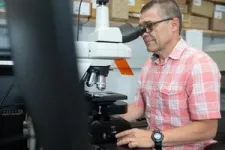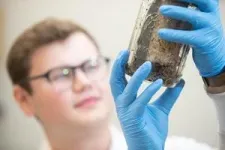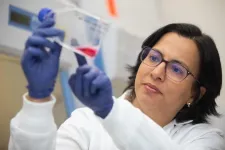(Press-News.org) MSU research suggests natural selection can slow evolution, maintain similarities across generations
Highlights:
New research from Michigan State University suggests that natural selection, famous for rewarding advantageous differences in organisms, can also preserve similarities.
Reporting in the journals New Phytologist and Evolution, the researchers worked with a plant called wild radish and its stamens, or pollen-producing parts, two of which are short and four are long.
Roughly 55 million years ago, wild radish ancestors had stamens of equal length. The team selectively bred — or artificially selected — wild radish to reduce the difference in stamen length and return the plant to a more ancestral look.
This shows that today’s wild radish and, likely, its family members still have the requisite genetic variability to evolve, but natural selection is preserving its different stamen lengths.
EAST LANSING, Mich. – Natural selection is usually understood in the context of change. When organisms deviate from the norm, they may gain advantages that let their lineages outlast those of their less-adaptable relatives.
But new research from Michigan State University suggests that natural selection also has the power to keep things the same.
“We always talk about the vast diversity of life and we should. It’s incredible. Natural selection has given us a lot of that diversity, probably most of it,” said Jeff Conner, a professor with the College of Natural Science and the W.K. Kellogg Biological Station, or KBS. “But natural selection can also cause similarities.”
Conner is also a faculty member in the Department of Plant Biology and MSU’s Ecology, Evolution and Behavior, or EEB, program. Additionally, he serves as president-elect of the American Society of Naturalists.
Conner and his team have published a new report in the journal New Phytologist that expands science’s understanding of natural selection in the face of another evolutionary mechanism called genetic constraint.
The idea behind constraint is that, as species evolve, they can lose genetic flexibility in certain areas. This drives specific traits to stabilize and persist through generations.
Roughly speaking, then, it’s tempting to think of natural selection as the accelerator of evolution, driving different or divergent traits and constraint as the brakes, maintaining or conserving similarities.
“Our work flips the script on that a little bit,” Conner said. “We’re suggesting that selection can also slow things down, that it can cause similarities as well as differences.”
During the peer-review process, the work was described as a fascinating project that challenged long-standing assumptions.
Probing selection and constraint
This new paper builds on another report from Conner’s group from earlier this year, led by graduate student Robin Waterman. That work was published in the journal Evolution and first hinted that selection could be responsible for conserving traits.
But the researchers still needed to rule out contributions from constraint, which they’ve done in the New Phytologist report.
In both studies, the researchers relied on wild radish as a model organism, but the plant is also a highly damaging weed in agriculture, especially in wheat fields in Australia and the southeastern United States.
In both publications, the researchers studied a defining feature of wild radish, which is the length of its stamens, or pollen-producing parts. Two of its six stamens are short and four are long.
This trait or feature is also shared widely across wild radish’s nearly 4,000 relatives in the mustard family. That includes Arabidopsis thaliana, another important model organism; garlic mustard, an invasive species in the United States; and many crops such as kale, cauliflower and Brussels sprouts.
So, although the researchers were focused on fundamental biology in these two reports, their work also could inspire future studies to benefit scientists and farmers across the globe.
To evaluate the influence of selection and constraint on this family’s distinctive stamen trait, the team turned to what’s called artificial selection. That is, they selectively bred wild radishes whose stamens were closer to the same length to try and change that characteristic.
“Perhaps the best method to test for short-term constraints is artificial selection because if a trait responds to artificial selection, it clearly can evolve,” the team wrote. “But if the trait does not respond, there is a constraint caused by a lack of genetic variation.”
Not only did the trait respond, it did so very quickly. The team reduced the stamen length difference by more than 30% during its experiments.
“This family of plants has maintained this four-long, two-short trait over 50 million years and we can get rid of a third of the difference in five generations, which would be five years,” Conner said. “My guess is if we kept going, we would get back to six stamens of equal length.”
The ancestors of this family had with stamens of equal length and a few species within the family have reverted to equal lengths over the intervening time. But wild radish and the majority of its relatives have evolved — and kept — the four-long, two-short motif likely thanks to natural selection.
Researchers believe the stamen of different lengths gives the species an advantage when it comes to how pollinators interact with the plant, but they aren’t sure exactly what that advantage is. Working with undergraduates and K-12 teachers through their lab at KBS, Waterman and Conner have designed experiments to look into that.
So wild radish still holds some mysteries, but it’s provided a potent reminder of the power of natural selection.
“Natural selection is very important,” Conner said. “A lot of things people have thought selection couldn’t do, we’re learning selection can do.”
This work was supported by the National Science Foundation. The research team also included members from Washington State University, Lanzhou University in China, the Napa County Resource Conservation District, Shippensburg University, Auburn University at Montgomery and Reed College.
By Matt Davenport
Read on MSUToday.
###
Michigan State University has been advancing the common good with uncommon will for more than 165 years. One of the world's leading research universities, MSU pushes the boundaries of discovery to make a better, safer, healthier world for all while providing life-changing opportunities to a diverse and inclusive academic community through more than 400 programs of study in 17 degree-granting colleges.
For MSU news on the Web, go to MSUToday. Follow MSU News on Twitter at twitter.com/MSUnews.
END
MSU research suggests natural selection can slow evolution, maintain similarities across generations
2023-08-23
ELSE PRESS RELEASES FROM THIS DATE:
New modeling method helps to understand extreme heat waves
2023-08-23
ITHACA, N.Y. - To prepare for extreme heat waves around the world – particularly in places known for cool summers – climate-simulation models that include a new computing concept may save tens of thousands of lives.
The concept, called “ensemble boosting,” uses computationally efficient modeling to simulate a large set of extreme but plausible heat waves, all while avoiding hundreds of hours of expensive calculations on large computers.
The study on the new modeling method, led by scientists at ETH Zurich, Switzerland and Cornell University, was published Aug. ...
Insurance data reveal that vasectomies are becoming more common in the U.S.
2023-08-23
In the wake of the 2022 Supreme Court ruling in Dobbs v. Jackson Women's Health Organization that overturned Roe v. Wade, researchers at the University of Chicago set out to investigate whether anticipation of restricted abortion access increased interest in vasectomies in the preceding years. In a new analysis, they found that vasectomy rates in the United States witnessed a remarkable surge from 2014 to 2021, as more men opted for the outpatient surgical procedure that offers permanent contraception by preventing ...
Researchers target lifecycle of parasite behind Chagas disease
2023-08-23
Almost everything about insects called kissing bugs is revolting, from the insidious way they bite people’s faces at night to drink their blood while they sleep to the way they spread disease through their poop.
Some carry a parasite called Trypanosoma cruzi that causes Chagas disease, a leading cause of disability and premature death in the Americas. Left untreated, Chagas disease can cause serious heart and digestive problems. It’s showing up more and more in patients in the United States.
Now researchers at the University of Cincinnati are investigating ...
Better or different? How brand differentiation affects pay and profits
2023-08-23
DURHAM, N.C. -- New research finds brands that leverage a reputation for quality to pay employees less risk eroding profits.
The paper, published online June 12 in the Journal of Marketing Research and authored by researchers from Duke University, London Business School and Texas A&M University, shows that vertical brand differentiation (being perceived as better) is associated with lower pay, whereas horizontal brand differentiation (being perceived as different) is associated with higher pay.
High-quality brands taking advantage of brand cachet to pay employees less erodes profits due to negative effects on employee productivity ...
ORNL wins six R&D 100 research awards
2023-08-23
Technologies developed by researchers at the Department of Energy’s Oak Ridge National Laboratory have received six 2023 R&D 100 Awards.
R&D World magazine announced the winners from their selection of finalists announced last week. The winners will be recognized at the organization’s award ceremony November 16 in San Diego, California.
“ORNL strives to deliver technological solutions for the nation’s toughest problems,” said interim ORNL Director Jeff Smith. “This year’s R&D 100 Awards are a reminder of how hard our scientists and engineers work to accomplish that feat.”
Often referred ...
Education levels and child age shaped caregivers’ concerns amid Covid-19 pandemic, NIH study suggests
2023-08-23
A caregiver’s education level and their child’s age played large roles in determining their primary sources of stress during the COVID-19 pandemic, researchers found in a recent study by NIH’s Environmental influences on Child Health Outcomes (ECHO) Program. Caregivers who had less than a high school education were less likely to work remotely and were more worried about finances, childcare, and access to necessities like food. Caregivers with a master’s degree or higher reported greater concern about social distancing and impacts on their work.
The ...
There’s a growing split in the middle of the economic distribution for Americans nearing retirement age
2023-08-23
A study by health policy researchers at Columbia University Mailman School of Public Health and University of Southern California projects that the expected health and economic well-being of Americans nearing retirement age in the lower half of the economic distribution today is no better than that of their counterparts more than two decades ago. The focus of most policy efforts has been to support the most disadvantaged, generally considered the lowest 15 percent of the population with respect to financial resources. Less attention has been drawn to those between the 15th and ...
Lower-middle class Americans near retirement are worse off than 20 years ago, new USC and Columbia study shows
2023-08-23
Lower-middle class Americans nearing retirement age are worse off than their counterparts more than two decades ago, while upper-middle Americans have largely seen their life expectancy and wealth improve. Policymakers, meanwhile, overlook the lower middle group of Americans who don’t qualify for many assistance programs. That’s according to a new study by the USC Schaeffer Center for Health Policy & Economics and the Columbia University Mailman School of Public Health.
Using data from the Health and Retirement Survey and a microsimulation called the Future Elderly Model, researchers estimated future life expectancy and disability for cohorts of individuals ...
Small study suggests long COVID may affect more people than previously thought
2023-08-23
EMBARGOED FOR RELEASE UNTIL 4 P.M. ET, WEDNESDAY, AUGUST 23, 2023
MINNEAPOLIS – Millions of Americans were exposed to SARS-CoV-2, the virus that causes COVID-19, early in the pandemic but could not get diagnosed due to testing limitations. Many of those people developed a post-viral syndrome with symptoms similar to those of long COVID. In a new study of a small group of those people, their immune response shows that 41% had evidence of SARS-CoV-2 exposure. The study is published in the August 23, 2023, online issue of Neurology® Neuroimmunology & Neuroinflammation, an official journal of the American Academy of Neurology. Long COVID was defined as symptoms persisting ...
A new targeted treatment shows promise for select patients with stomach cancer
2023-08-23
An international phase 3 clinical trial, done in participation with Weill Cornell Medicine and NewYork-Presbyterian, found that a new targeted treatment called zolbetuximab, given in combination with a standard chemotherapy, extended survival for patients with advanced gastric or gastroesophageal junction cancer that overexpressed a specific biomarker.
Results from the GLOW study, published July 31 in Nature Medicine, together with results from the parallel SPOTLIGHT study that evaluated zolbetuximab with an alternative standard chemotherapy, prompted the ...





